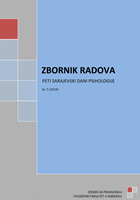Vrednosti kod mladih sa severa Kosova
System of values of young people from North Kosovo.
Author(s): Anđela KeljanovićSubject(s): Social psychology and group interaction, Social Theory, Sociology of Culture, Sociology of Politics
Published by: Filozofski fakultet Univerziteta u Sarajevu
Keywords: values; SDT; well-being; young people;
Summary/Abstract: By this work, we want to empirically determine whether the relation of value and well-being is based on the theory of self-determination. According to the theory of self-determination, the activities that reflect internal needs bring more satisfaction than the activities that reflect the external ones. Based on the assumption of „healthy“ and „unhealthy“ values where „healthy“ values contribute to positive well-being, and unhealthy values worsen well-being, we expect that our „healthy“ and „unhealthy“ values will also identified in our sample. The sample included 400 students from the Faculty of Philosophy and Technical Faculty in Kosovska Mitrovica, average age M=21.48, SD=2.48. The following instruments were used: Scale Continuum of Mental Health-Long Form, Schwarz Scale of Universal Values and Socio-Demographic Questionnaire. Based on the data obtained and the values displayed on our entire sample of young people, we can notice that values that contribute positively to well-being belong to the „healthy values“ group. The following value orientations have been singled out: Self-direction, Humanity, Universalism as healthy values, if we add the value of Achievement to that, we get a set of values that are related to the growth needs of Schwartz. As „unhealthy“ values, we highlight Tradition, Security and Power. The hypothesis of „healthy“ and „unhealthy“ values is somewhat confirmed, as these values, as we expected, contribute to wellbeing according to whether they belong to a group of „healthy“ or „unhealthy“ values.
Journal: SARAJEVSKI DANI PSIHOLOGIJE: ZBORNIK RADOVA
- Issue Year: 5/2019
- Issue No: 5
- Page Range: 4-19
- Page Count: 16
- Language: Serbian

